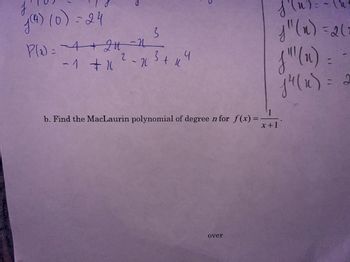
Calculus: Early Transcendentals
8th Edition
ISBN: 9781285741550
Author: James Stewart
Publisher: Cengage Learning
expand_more
expand_more
format_list_bulleted
Question

Transcribed Image Text:y (4) (0) = 24
P(₁) = 4+24 2
3
2
- 1 + x ² - x ³ + 14
1
j"(x) = 2(1
j'! (n)
j4 (u) = 2
b. Find the MacLaurin polynomial of degree n for f(x) = -
x+1
over
1
Expert Solution
This question has been solved!
Explore an expertly crafted, step-by-step solution for a thorough understanding of key concepts.
This is a popular solution
Trending nowThis is a popular solution!
Step by stepSolved in 3 steps with 1 images

Knowledge Booster
Similar questions
- Find an nth degree polynomial. What is f(x)? n=3 4 and 4i are the zeros F(-1)=-255 F(x)=arrow_forward1. Consider the polynomial f(x) = (x – 1)(x+2)(x- 3)(x+5). A. What are the roots of f? B. Suppose you were to multiply the polynomial out; what would the leading coefficient of f be? C. Suppose you were to multiply the polynomial out; what would the constant term of f be?arrow_forwarda. Find the linear approximating polynomial for the following function centered at the given point a.arrow_forward
- Find the nth Maclaurin polynomial for the function. f(x) : Зх — 4 x + 1 n = 4 P4(x) :arrow_forwarda. Find the linear approximating polynomial for the following function centered at the given point a. b. Find the quadratic approximating polynomial for the following function centered at the given point a. c. Use the polynomials obtained in parts a. and b. to approximate the given quantity. 1 f(x) = 1 --, a = 1; approximate 1.08arrow_forwarda. Find the linear approximating polynomial for the following function centered at the given point a. b. Find the quadratic approximating polynomial for the following function centered at the given point a. c. Use the polynomials obtained in parts a. and b. to approximate the given quantity. f(x) = 8x³/2, a = 1; approximate 8(1.73/2) a. p₁(x) = b. p₂(x) = c. Using the linear approximating polynomial to estimate, 8 (1.73/2) is approximately (Simplify your answer.) Using the quadratic approximating polynomial to estimate, 8(1.73/2) is approximately. (Simplify your answer.)arrow_forward
- Suppose f (x) = p(x)/q(x) , where p and q are polynomial functions with no common zeros. For what value(s) of x is f (x) undefined?arrow_forwardFind the following values for the given polynomial Function. (a)f(0) (b)f(5) (c)f(-2) f(x)=x2-9x-2arrow_forwardConsider f (x) = 2x* – x3 – 5x2 + 2x + 2. 1. List all possible zeros (candidates) for f(x). 2. Define f (x) in your calculator or desmos. Use the graph to narrow down your candidates. Use synthetic division to reduce f (x) to a quadratic expression. Factor the resulting quadratic expression to find the last two zeros. ZEROS: 3. Express f(x) as a product of linear factors. Don't forget to include the value of a!arrow_forward
- #2: Completely factor the following polynomial functions. a) f(x) = x' – 4x² – 1 1x + 30arrow_forwardDetermine the degree of each of the following polynomial functions. a. f(x) = 1+ x + x² + x³ Degree of f: b. g(x) = x8 – 272 Degree of g: c. h(x) = x³ + 2x' + 1 Degree of h: d. j(x) x2 – 16 Degree of j: Submitarrow_forward
arrow_back_ios
arrow_forward_ios
Recommended textbooks for you
 Calculus: Early TranscendentalsCalculusISBN:9781285741550Author:James StewartPublisher:Cengage Learning
Calculus: Early TranscendentalsCalculusISBN:9781285741550Author:James StewartPublisher:Cengage Learning Thomas' Calculus (14th Edition)CalculusISBN:9780134438986Author:Joel R. Hass, Christopher E. Heil, Maurice D. WeirPublisher:PEARSON
Thomas' Calculus (14th Edition)CalculusISBN:9780134438986Author:Joel R. Hass, Christopher E. Heil, Maurice D. WeirPublisher:PEARSON Calculus: Early Transcendentals (3rd Edition)CalculusISBN:9780134763644Author:William L. Briggs, Lyle Cochran, Bernard Gillett, Eric SchulzPublisher:PEARSON
Calculus: Early Transcendentals (3rd Edition)CalculusISBN:9780134763644Author:William L. Briggs, Lyle Cochran, Bernard Gillett, Eric SchulzPublisher:PEARSON Calculus: Early TranscendentalsCalculusISBN:9781319050740Author:Jon Rogawski, Colin Adams, Robert FranzosaPublisher:W. H. Freeman
Calculus: Early TranscendentalsCalculusISBN:9781319050740Author:Jon Rogawski, Colin Adams, Robert FranzosaPublisher:W. H. Freeman
 Calculus: Early Transcendental FunctionsCalculusISBN:9781337552516Author:Ron Larson, Bruce H. EdwardsPublisher:Cengage Learning
Calculus: Early Transcendental FunctionsCalculusISBN:9781337552516Author:Ron Larson, Bruce H. EdwardsPublisher:Cengage Learning

Calculus: Early Transcendentals
Calculus
ISBN:9781285741550
Author:James Stewart
Publisher:Cengage Learning

Thomas' Calculus (14th Edition)
Calculus
ISBN:9780134438986
Author:Joel R. Hass, Christopher E. Heil, Maurice D. Weir
Publisher:PEARSON

Calculus: Early Transcendentals (3rd Edition)
Calculus
ISBN:9780134763644
Author:William L. Briggs, Lyle Cochran, Bernard Gillett, Eric Schulz
Publisher:PEARSON

Calculus: Early Transcendentals
Calculus
ISBN:9781319050740
Author:Jon Rogawski, Colin Adams, Robert Franzosa
Publisher:W. H. Freeman


Calculus: Early Transcendental Functions
Calculus
ISBN:9781337552516
Author:Ron Larson, Bruce H. Edwards
Publisher:Cengage Learning